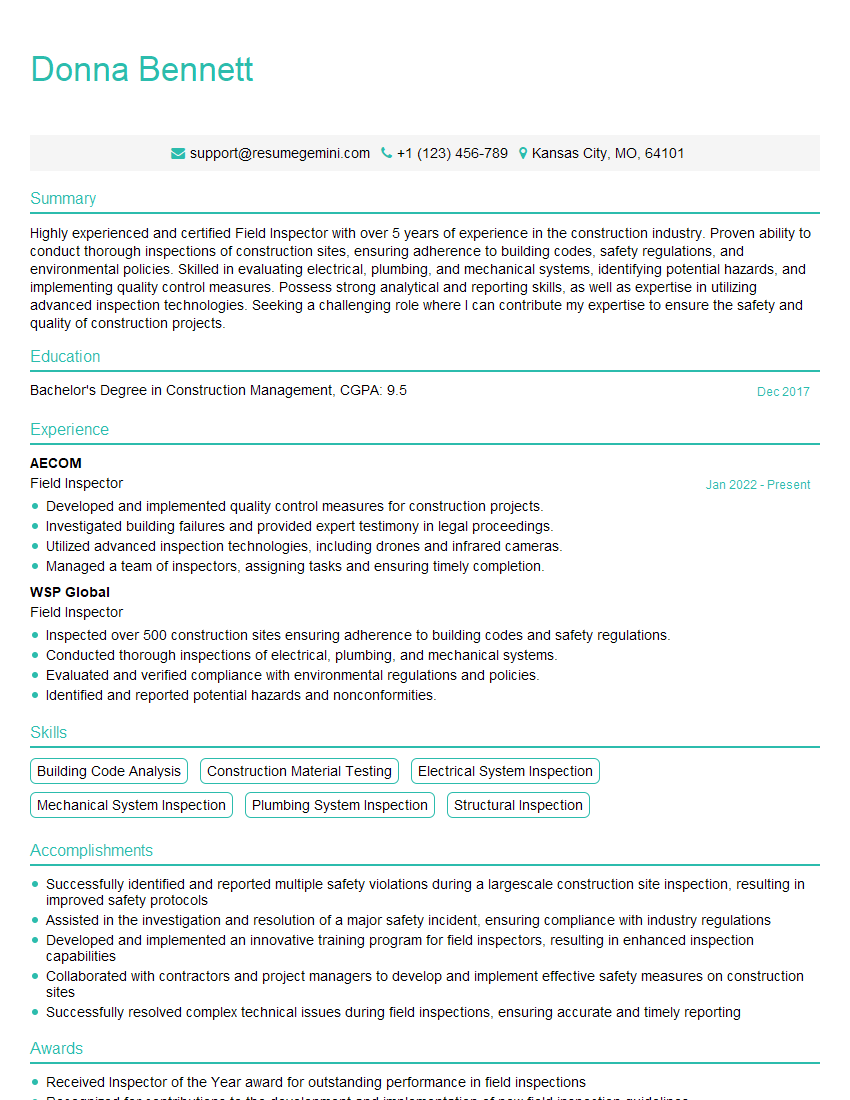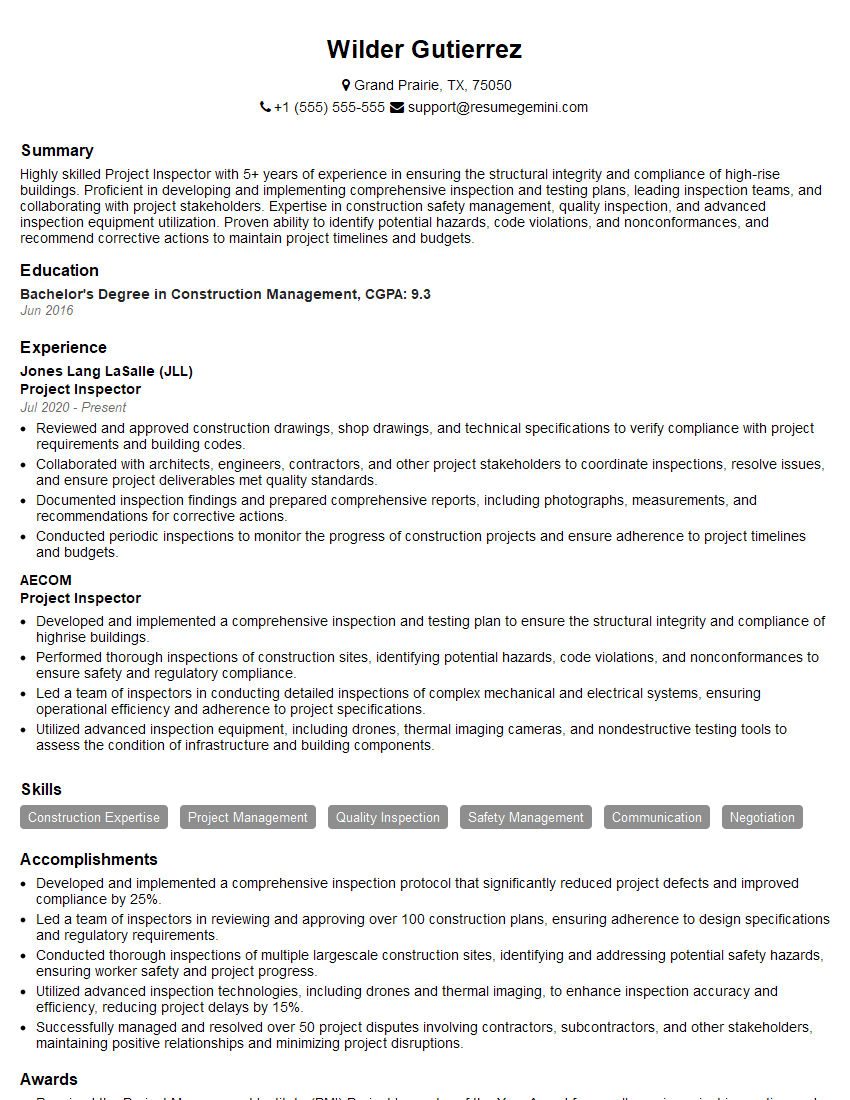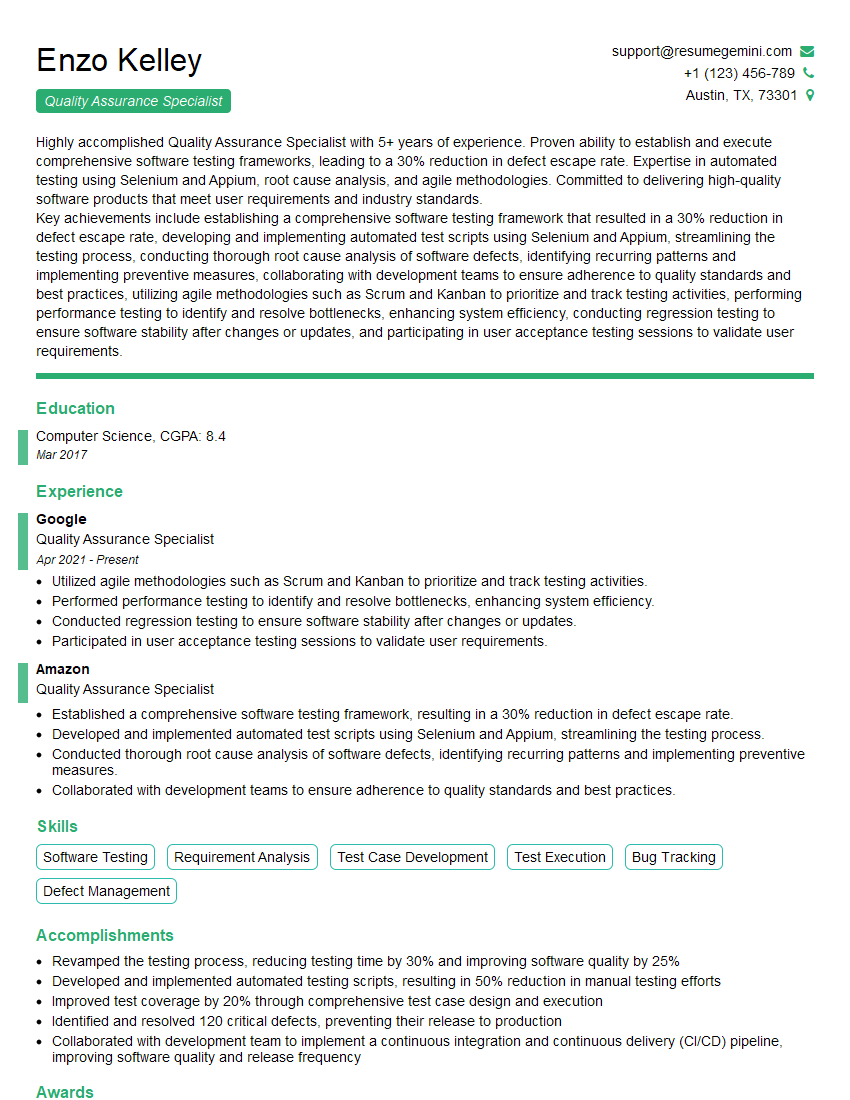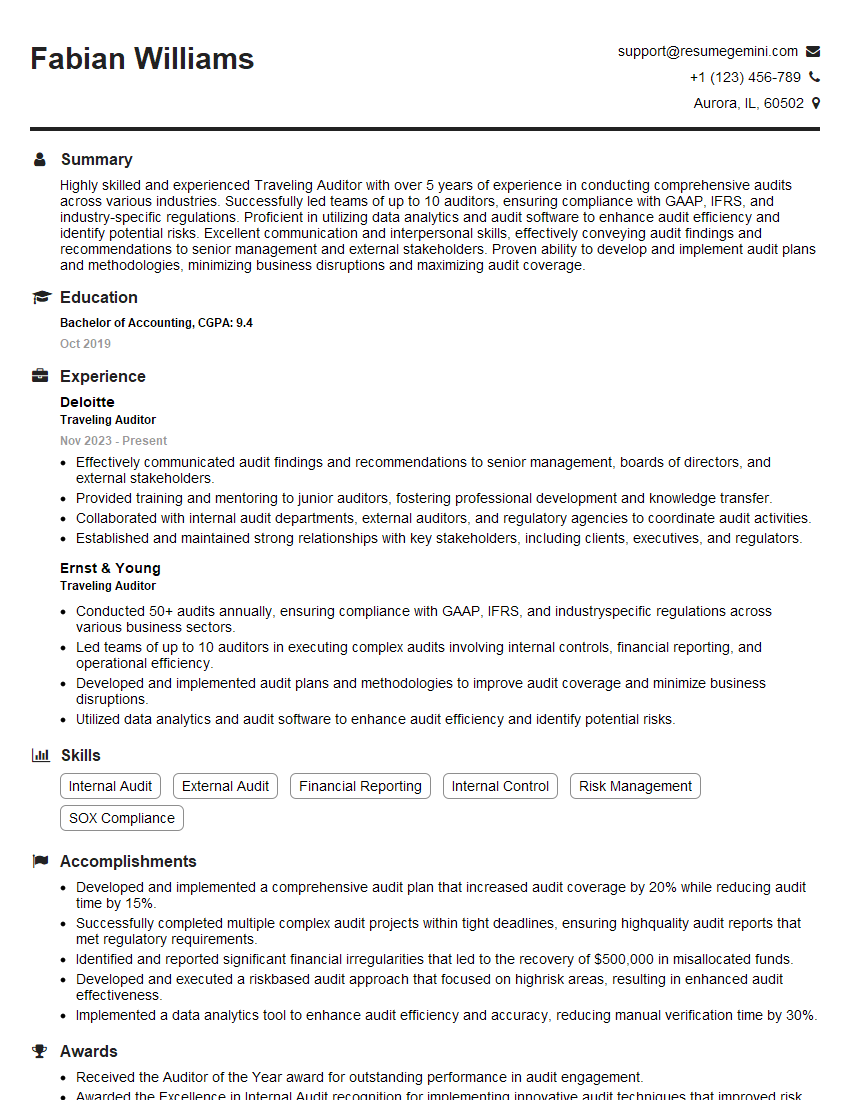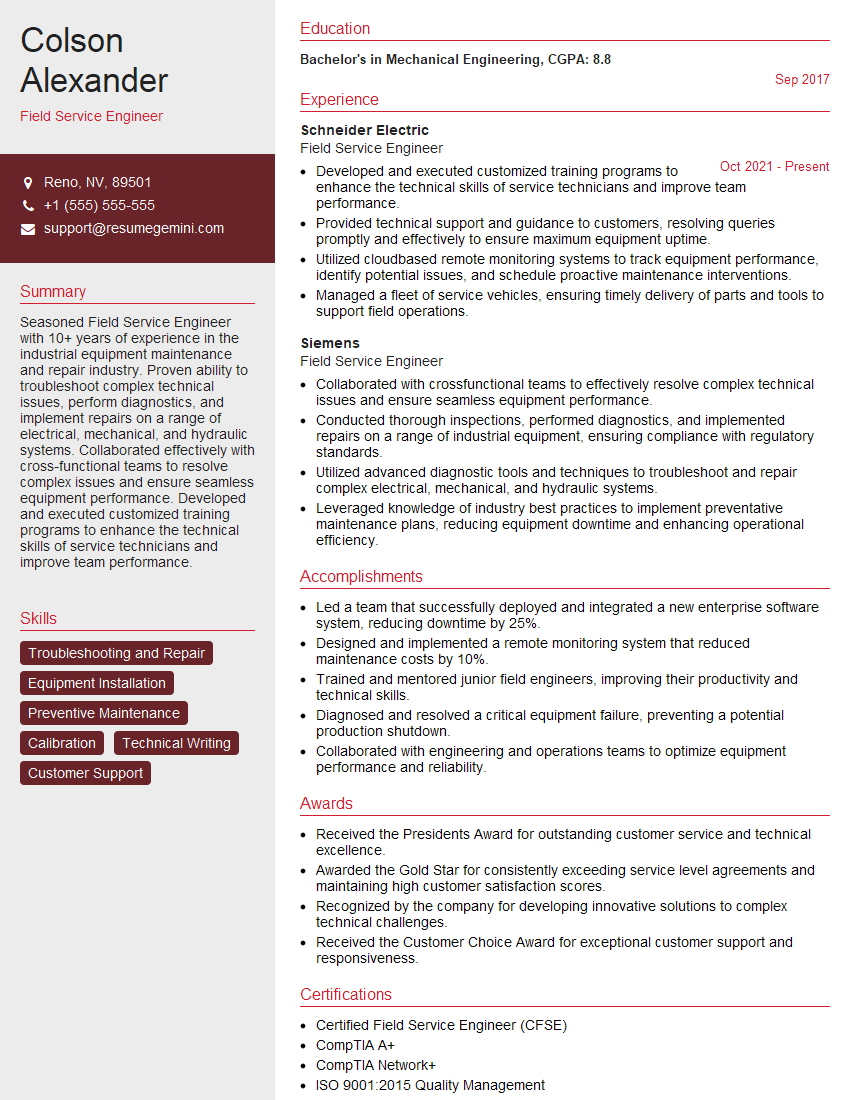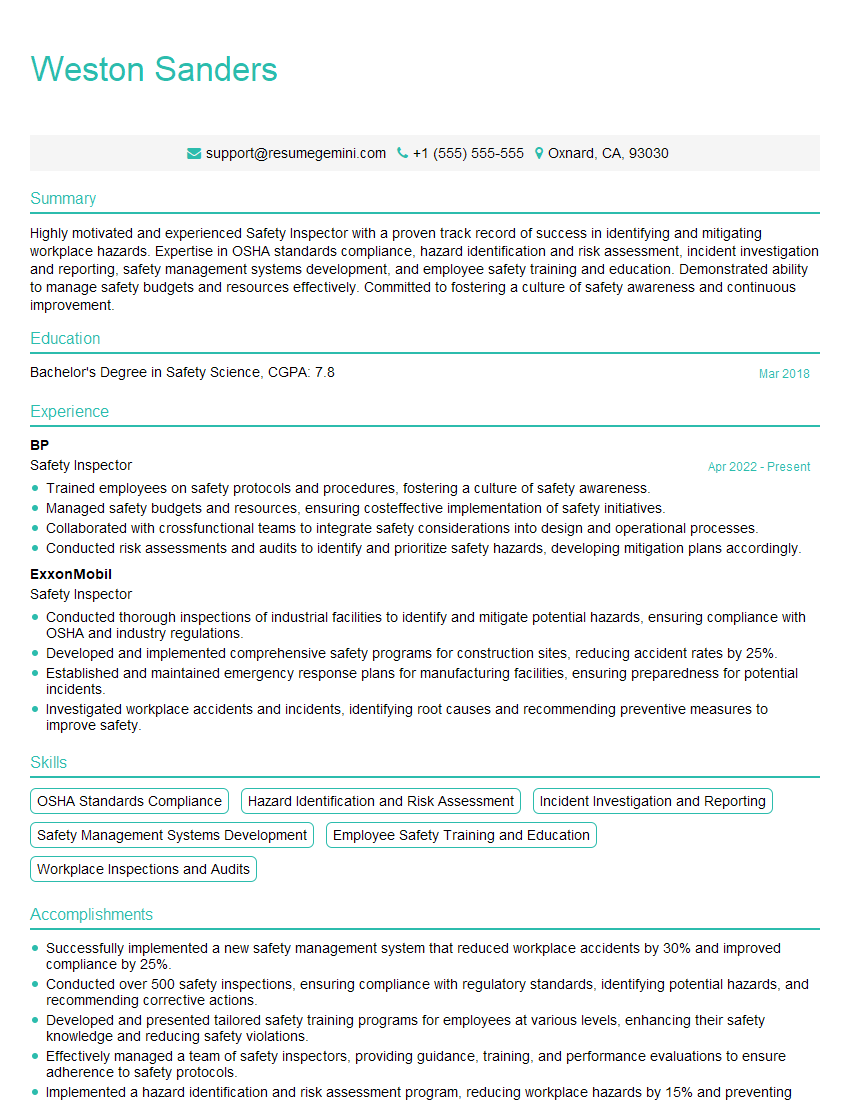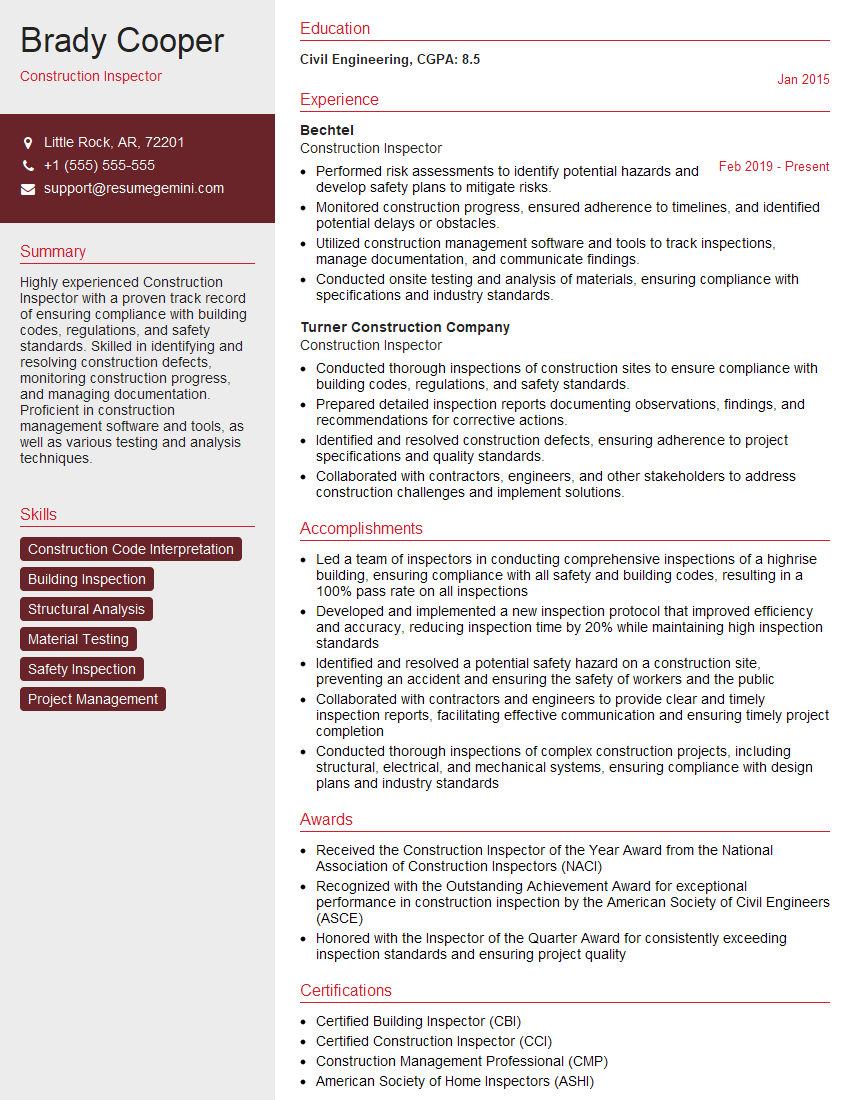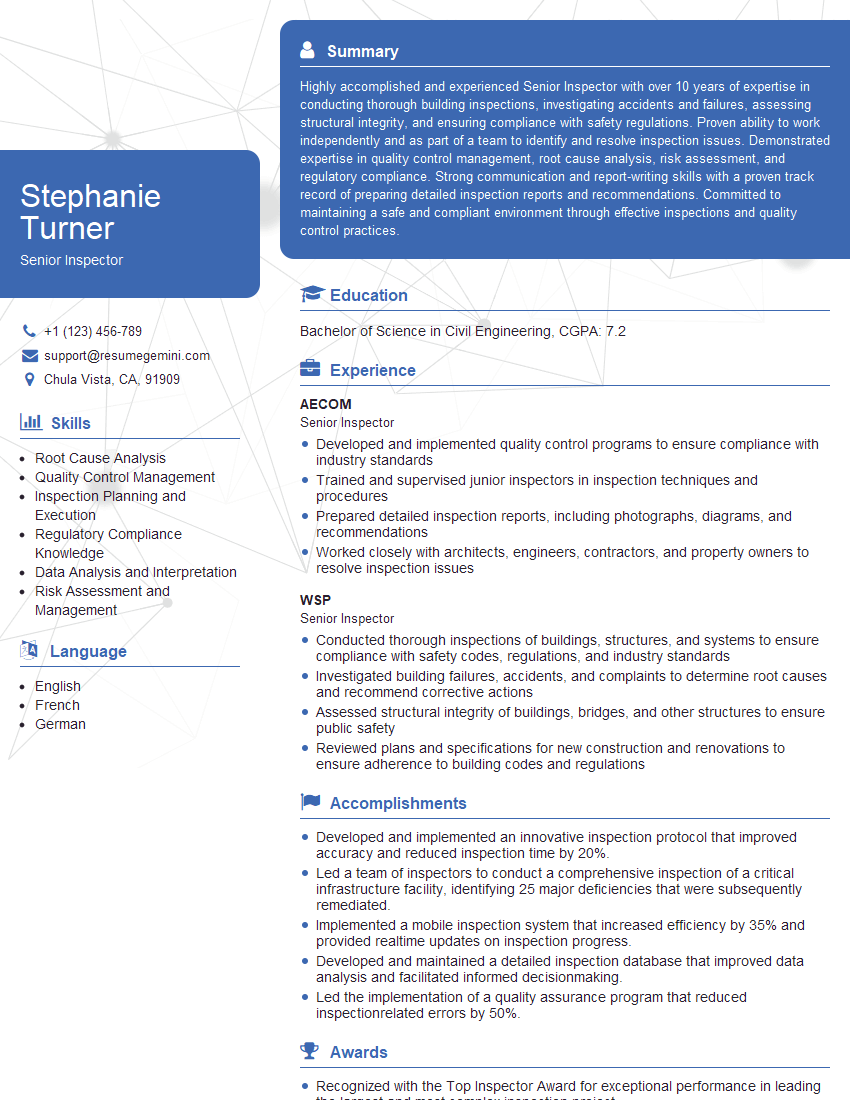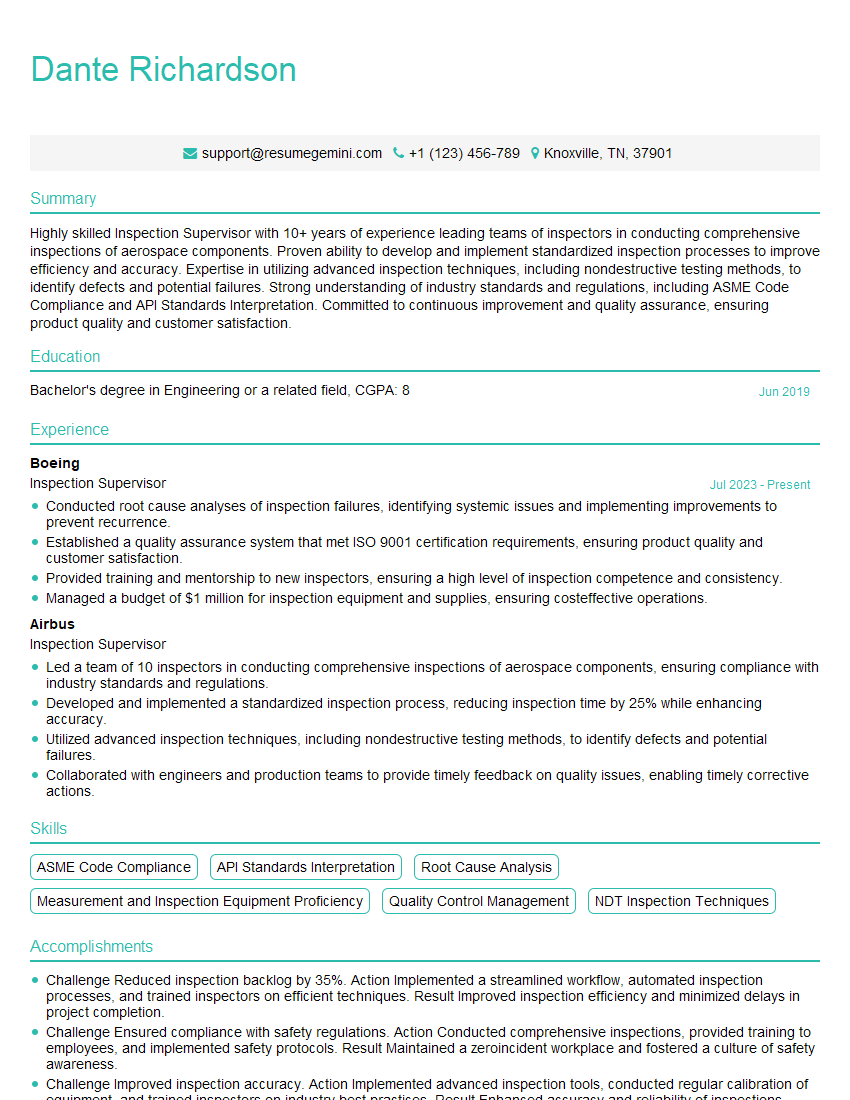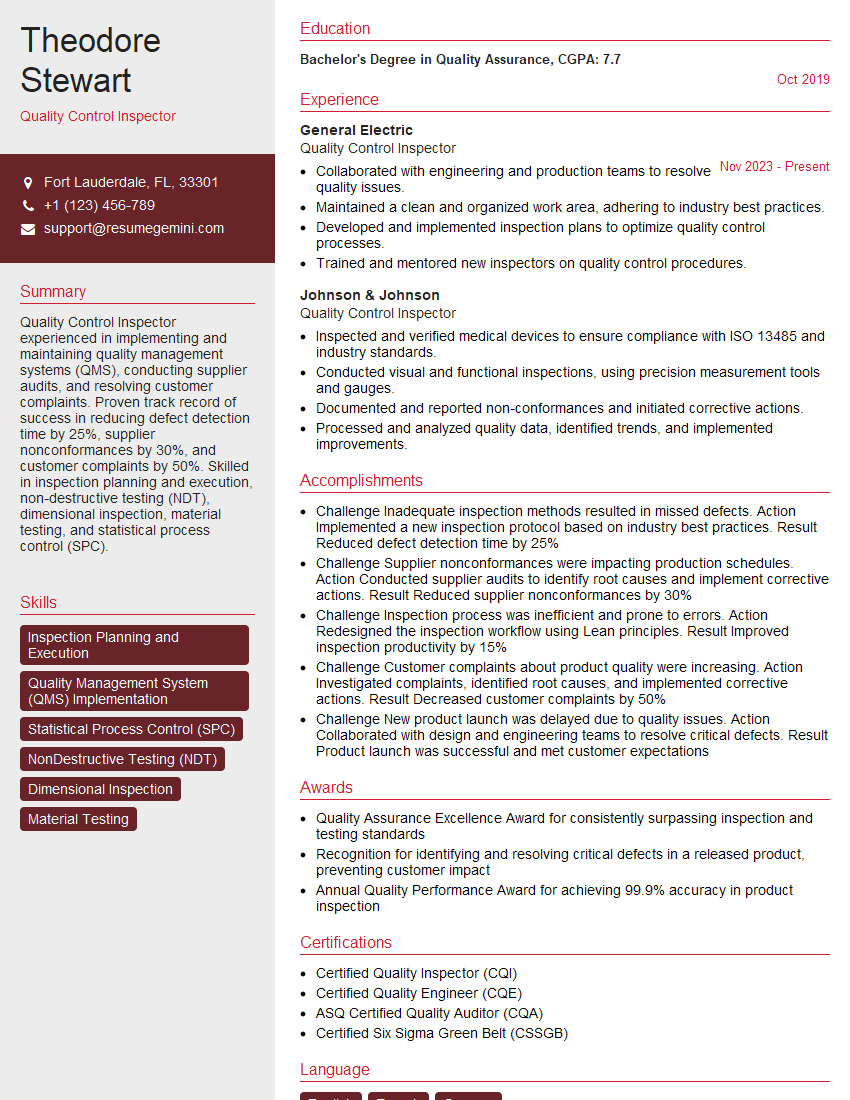Interviews are opportunities to demonstrate your expertise, and this guide is here to help you shine. Explore the essential Willingness to Travel for Inspections interview questions that employers frequently ask, paired with strategies for crafting responses that set you apart from the competition.
Questions Asked in Willingness to Travel for Inspections Interview
Q 1. Describe your experience with extensive travel for work.
My experience with extensive travel for work spans over 15 years, encompassing various roles in the quality assurance and compliance sectors. I’ve conducted hundreds of inspections across diverse geographical locations, including remote sites with limited infrastructure. This has involved navigating different cultures, time zones, and regulatory landscapes, always prioritizing safety and efficiency. My travel has ranged from short domestic trips to multi-week international assignments, consistently requiring adaptability and meticulous planning. I am comfortable with the demands of extensive travel and possess a proven track record of successfully managing logistical challenges while maintaining a high level of professionalism and productivity.
Q 2. What is your preferred mode of transportation for inspections?
My preferred mode of transportation for inspections depends largely on the destination and the urgency of the assignment. For shorter distances and ease of access to smaller sites, a reliable vehicle, either my own or a rental car, is ideal. This allows for greater flexibility in scheduling and the ability to carry necessary equipment. For longer distances or international travel, air travel is unavoidable. However, I prioritize safety and select airlines with a strong safety record. In circumstances requiring access to remote or challenging terrains, I’m comfortable and experienced using various forms of ground transportation such as helicopters or four-wheel drives, always prioritizing safety and the advice of local experts.
Q 3. How do you handle unexpected travel delays or disruptions?
Unexpected delays or disruptions are an inherent part of extensive travel. My approach involves proactive risk mitigation. This starts with thorough pre-trip planning, including alternative travel options and contingency plans. Should a delay occur, I immediately inform all relevant stakeholders – clients, colleagues, and local contacts – ensuring transparency and managing expectations. I then leverage technology – utilizing flight tracking apps, and contacting customer service – to explore alternative routes or reschedule my itinerary effectively and with minimal disruption to the inspection schedule. I’ve successfully navigated weather-related delays, flight cancellations, and unexpected border control issues by remaining calm and resourceful, always focusing on finding solutions rather than dwelling on the problem.
Q 4. Are you comfortable with irregular work hours associated with travel?
Yes, I am completely comfortable with irregular work hours associated with travel. The nature of inspections often requires flexibility in scheduling to accommodate local time zones, site accessibility, and the needs of the clients. I’m accustomed to working early mornings, late nights, and weekends, as needed. I prioritize efficient time management and maintain a healthy work-life balance, even in challenging circumstances, to avoid burnout. My strong work ethic allows me to complete tasks efficiently, regardless of the time constraints imposed by travel.
Q 5. How do you manage your personal life while traveling extensively for work?
Managing personal life while traveling extensively requires careful planning and a proactive approach. I maintain consistent communication with my family and friends, scheduling regular calls and utilizing technology to stay connected. During periods of extended travel, I strategically schedule downtime to pursue hobbies or engage in relaxing activities to maintain a sense of well-being and prevent burnout. I ensure my personal appointments are scheduled well in advance and confirm arrangements for home maintenance to minimize stress. This proactive management of personal responsibilities prevents conflicts and allows me to effectively balance both work and personal life.
Q 6. Describe a time you had to adapt to a new environment while on an inspection.
During an inspection in a remote region of South America, I encountered significant language barriers and cultural differences. To overcome this, I proactively learned basic Spanish phrases before my trip and utilized a translation app. I also established relationships with local contacts who served as invaluable guides and interpreters, helping me navigate cultural nuances and understand local regulations. I embraced the challenge, demonstrating respect for local customs and demonstrating adaptability. This experience not only resulted in a successful inspection but also enriched my understanding of cross-cultural communication and problem-solving, which are critical skills in my profession.
Q 7. How do you ensure efficient packing and organization while traveling for inspections?
Efficient packing and organization are essential for seamless inspections. I utilize a packing list checklist, categorized by inspection type and location, to ensure I bring all necessary equipment, tools, and clothing appropriate for the climate and site conditions. I employ a modular packing system using packing cubes and compression bags to maximize space and minimize wrinkles. All essential documents, both digital and physical, are stored in easily accessible locations. This methodical approach ensures I’m prepared for any situation, reducing stress and maximizing my efficiency during the inspection process.
Q 8. What is your experience with international travel for inspections (if applicable)?
My experience with international travel for inspections spans over eight years, encompassing projects across Europe, Asia, and South America. I’ve conducted inspections in diverse settings, from bustling manufacturing plants to remote agricultural facilities. This extensive travel has provided me with invaluable firsthand experience in navigating different cultural contexts, regulatory environments, and logistical challenges inherent in international inspections.
For instance, during an inspection of a pharmaceutical facility in India, I had to navigate complex local regulations regarding documentation and safety protocols. This experience significantly enhanced my understanding of global compliance standards and their practical application.
Another memorable experience involved coordinating an inspection team across multiple time zones for a large-scale infrastructure project in Brazil. This required meticulous planning, clear communication, and a strong understanding of local customs and business practices.
Q 9. How familiar are you with various travel documentation and visa requirements?
I possess a thorough understanding of various travel documents and visa requirements. My familiarity extends beyond simply obtaining necessary visas; it includes comprehending the nuances of different visa types (e.g., tourist, business, transit), their validity periods, and any associated restrictions. I’m proficient in using online resources to research and obtain the correct documentation for each specific destination.
For example, I know the difference between a Schengen visa (allowing travel within the Schengen Area) and a national visa for a specific country. I’m also aware of the importance of ensuring sufficient validity periods on passports and any additional requirements specific to certain countries, such as proof of onward travel or sufficient funds.
My approach to managing travel documents is systematic and meticulous. I always maintain a digital and physical copy of all important documents, securely stored and easily accessible.
Q 10. How do you stay safe while traveling alone for work?
Safety is paramount when traveling alone for work. My approach is multi-layered, incorporating proactive measures and situational awareness. Before any trip, I thoroughly research my destination, identifying potential risks and taking appropriate precautions.
- Pre-trip planning: This includes researching safe transportation options, accommodation in well-lit and secure areas, and understanding local laws and customs.
- Communication: I always inform someone of my itinerary, including flight details, accommodation information, and planned activities. Regular check-ins with family or colleagues are essential.
- Situational awareness: I remain vigilant about my surroundings, avoid walking alone at night in unfamiliar areas, and trust my instincts. If a situation feels unsafe, I prioritize my safety and seek assistance.
- Emergency preparedness: I carry emergency contact information, a local emergency number, and a copy of my passport and other important documents. I also ensure my phone is fully charged and have a backup power source.
Essentially, it’s about being prepared, informed, and consistently making safe choices.
Q 11. How do you manage your expenses effectively while traveling?
Effective expense management during travel is crucial. My approach involves careful budgeting, accurate record-keeping, and utilizing tools designed for travel expense tracking. Before a trip, I create a detailed budget outlining anticipated costs for flights, accommodation, transportation, meals, and incidentals.
During the trip, I meticulously track all expenses using a dedicated expense tracking app. I gather receipts for all purchases and ensure they are correctly categorized. This detailed record-keeping makes reconciling expenses at the end of the trip much easier.
I also prioritize finding cost-effective options without compromising on safety and comfort. This might involve choosing budget-friendly accommodation options, utilizing public transportation when appropriate, or opting for meals at local eateries rather than expensive restaurants. I leverage corporate discounts or travel rewards programs whenever possible to further optimize spending.
Q 12. How do you maintain consistent communication with your team while traveling?
Maintaining consistent communication with my team while traveling is vital for project success. My strategy relies on a combination of tools and proactive communication.
- Regular check-ins: I schedule regular check-in calls or video conferences with my team to provide updates on my progress, address any urgent issues, and ensure everyone is aligned.
- Email and instant messaging: I use email for formal communication and instant messaging for quick updates or questions. This allows for efficient and timely information sharing.
- Project management software: We utilize a project management platform (e.g., Asana, Trello) to track tasks, deadlines, and progress. This ensures transparency and keeps everyone informed, even when I’m offline.
- Cloud-based file sharing: Using cloud-based services allows for seamless access to project documents from any location.
Choosing the right communication tools and having a clear communication plan before the trip ensures a smooth workflow, even across different time zones.
Q 13. How do you deal with jet lag and maintain productivity while traveling across time zones?
Jet lag can significantly impact productivity. To mitigate its effects, I employ a multi-pronged strategy that starts well before the trip.
- Pre-trip adjustment: In the days leading up to the trip, I gradually adjust my sleep schedule to align with the destination’s time zone. This helps minimize the shock to my body clock.
- Hydration and healthy habits: Staying well-hydrated and maintaining healthy eating habits during the trip is essential for combating fatigue.
- Light exposure: On arrival, I try to get exposure to natural light to help regulate my circadian rhythm.
- Strategic scheduling: I schedule more demanding tasks for times when I’m likely to feel more alert. I also allow for flexibility in my schedule to account for unexpected fatigue.
- Melatonin (if necessary): In some cases, I may use melatonin supplements to help regulate my sleep cycle, but only after consulting with my doctor.
By proactively managing my sleep and overall well-being, I can maintain a reasonable level of productivity despite the challenges of jet lag.
Q 14. Have you ever encountered logistical challenges during inspections? How did you solve them?
Yes, I’ve encountered several logistical challenges during inspections. One memorable instance involved a sudden, unexpected power outage at a manufacturing facility in Vietnam during a crucial stage of the inspection. The outage impacted the functionality of essential equipment and threatened to delay the inspection significantly.
My solution was to remain calm and quickly assess the situation. I collaborated with the facility’s management to identify alternative power sources or workarounds. We utilized portable lighting and resorted to manual data collection where necessary. We maintained open communication with my team, updating them on the situation and our contingency plan. While the outage caused a temporary delay, our proactive response ensured we completed the inspection within an acceptable timeframe and without compromising the integrity of our findings. The key was adaptability, clear communication, and collaborative problem-solving.
Q 15. Describe your experience using travel booking tools and apps.
My experience with travel booking tools and apps is extensive. I’m proficient in using platforms like Expedia, Kayak, Google Flights, and Hopper to find the best flight and accommodation deals, comparing prices and features across different providers. I also utilize corporate travel management tools that streamline the booking process, ensuring compliance with company policies and maximizing cost savings. For example, I recently used Hopper’s price prediction feature to successfully book a flight to a remote inspection site at a significantly lower price than initially quoted. Beyond flights and hotels, I’m adept at using ride-sharing apps like Uber and Lyft, as well as public transportation apps for navigating unfamiliar cities efficiently and cost-effectively. My familiarity extends to managing itineraries and booking car rentals through these platforms, always prioritizing options that balance cost, convenience, and safety.
Career Expert Tips:
- Ace those interviews! Prepare effectively by reviewing the Top 50 Most Common Interview Questions on ResumeGemini.
- Navigate your job search with confidence! Explore a wide range of Career Tips on ResumeGemini. Learn about common challenges and recommendations to overcome them.
- Craft the perfect resume! Master the Art of Resume Writing with ResumeGemini’s guide. Showcase your unique qualifications and achievements effectively.
- Don’t miss out on holiday savings! Build your dream resume with ResumeGemini’s ATS optimized templates.
Q 16. What is your strategy for staying healthy and productive while traveling frequently?
Maintaining health and productivity while traveling frequently is paramount. My strategy involves a multi-pronged approach. Firstly, I prioritize sleep; I always aim for a consistent sleep schedule, even when jet-lagged, understanding that adequate rest is crucial for both physical and mental well-being. Secondly, I focus on nutrition; I pack healthy snacks to avoid relying on unhealthy airport or roadside options. I also try to find time for regular exercise, even if it’s just a brisk walk or a hotel gym workout. Thirdly, I actively manage stress through mindfulness techniques like meditation or deep breathing exercises. This helps me cope with the unpredictable nature of travel and maintain a focused mindset during inspections. Finally, I stay hydrated by carrying a reusable water bottle and ensuring I consistently drink water throughout the day. Think of it like maintaining a finely-tuned machine – regular maintenance keeps it running smoothly.
Q 17. How comfortable are you working independently and making decisions while in the field?
I’m exceptionally comfortable working independently and making decisions in the field. My experience has equipped me with the ability to assess situations, analyze data, and make informed judgments without constant supervision. For instance, during an inspection of a remote wind farm, a critical piece of equipment malfunctioned. I swiftly assessed the situation, contacted the relevant technicians, and implemented a temporary solution to prevent further damage, thus avoiding significant project delays. This requires a blend of technical expertise, problem-solving skills, and decisive action – all qualities I’ve honed over years of independent field work. I always maintain open communication with my team, providing regular updates and seeking guidance only when absolutely necessary.
Q 18. How do you handle unexpected challenges or problems during inspections?
Handling unexpected challenges is an inherent part of field inspections. My approach is systematic: First, I assess the severity of the problem. Is it a minor inconvenience or a significant obstacle? Second, I develop a plan to mitigate the problem. This often involves resourcefulness, improvisational skills, and quick thinking. For example, during an inspection in a region experiencing unexpected heavy rain, I had to improvise a temporary shelter to protect my equipment and myself. Third, I document the challenge and its resolution meticulously, ensuring all stakeholders are informed and the necessary steps are taken to prevent similar issues in the future. This systematic approach allows for effective problem-solving and minimal disruption to the overall inspection process.
Q 19. How do you prioritize your tasks while balancing the demands of travel and inspections?
Balancing travel and inspection demands necessitates effective task prioritization. I use a combination of techniques. Firstly, I create a detailed itinerary that incorporates travel time, inspection schedules, and buffer time for unexpected delays. Secondly, I prioritize tasks based on urgency and importance using methods like the Eisenhower Matrix (urgent/important). This allows me to focus on critical inspection tasks while allocating time for travel-related logistics and administrative work. Thirdly, I utilize digital tools like project management software to track progress and ensure accountability. For example, I might schedule pre-travel document review for the flight and allocate a specific time block for completing inspection reports upon my return. This structured approach optimizes my time and ensures I meet all deadlines, regardless of the travel demands.
Q 20. Describe your proficiency with various inspection tools and equipment while traveling.
Proficiency with inspection tools and equipment while traveling is crucial. My expertise spans various instruments, including digital cameras, thermal imaging cameras, laser measuring devices, and specialized software for data collection and analysis. I’m trained in the proper handling, calibration, and maintenance of this equipment. Before traveling, I always ensure that all necessary tools are packed securely, with appropriate charging equipment and backup batteries. In addition, I maintain a thorough understanding of their operation, even in challenging field conditions. During a recent inspection, the battery of my thermal imaging camera unexpectedly failed. Having a backup battery and the knowledge of how to quickly replace it prevented significant delays in the inspection.
Q 21. How do you ensure the accuracy and completeness of your reports while traveling?
Ensuring accuracy and completeness of reports while traveling requires meticulous record-keeping and a disciplined approach. I maintain detailed notes during each inspection, using both digital and physical methods. Digital notes are stored securely in the cloud, and physical notes are stored in a protective case. All data is cross-referenced to ensure consistency and completeness. Furthermore, I utilize specialized software to process and analyze the collected data, generating accurate and comprehensive reports. Before finalizing any report, I conduct a rigorous review process to identify and rectify any potential errors. Clear, concise, and detailed reporting is my top priority, even while working in demanding travel situations.
Q 22. What is your experience with different types of accommodation while traveling for work?
My experience with accommodation while traveling for inspections is extensive, encompassing a wide range of options depending on the location, duration, and budget of the assignment. I’ve stayed in everything from budget-friendly hotels and motels to upscale business hotels and even occasionally utilized Airbnb for longer stays offering more residential comfort. I prioritize safety and cleanliness above all else and am adaptable to different levels of amenities. For example, during a recent inspection in a remote area, a simple, clean motel proved sufficient, while for a week-long project in a major city, a hotel with reliable internet and a business center was essential. My ability to adjust to various accommodation types ensures efficiency and comfort throughout my travels.
Q 23. What is your level of comfort with various forms of transportation (e.g., car, plane, train)?
I am highly comfortable with various forms of transportation. I frequently utilize airplanes for long-distance travel, prioritizing airlines known for their reliability and on-time performance. For shorter distances, I am equally comfortable driving my own car, allowing for greater flexibility in scheduling and site access. Trains are another viable option, especially for inter-city travel where traffic might be a concern. I always factor in travel time, potential delays, and the overall efficiency of each method when planning my itinerary. For instance, a cross-country inspection might necessitate air travel, while local inspections often involve driving, allowing for spontaneous site visits as needed.
Q 24. Describe your familiarity with various weather conditions and how you adjust your inspection plans accordingly.
I am experienced in working across diverse weather conditions. My familiarity extends to everything from extreme heat and humidity to blizzards and torrential rain. Before each inspection, I meticulously check the forecast and adjust my plans accordingly. This includes packing appropriate clothing and gear, scheduling inspections to avoid inclement weather where possible, and having contingency plans in place should conditions deteriorate unexpectedly. For instance, if a snowstorm is anticipated, I’ll reschedule outdoor inspections and prioritize indoor ones. If there’s a heatwave, I’ll ensure I have sufficient water and plan for frequent breaks. Safety is always paramount.
Q 25. How would you handle a situation where an inspection is delayed due to unforeseen circumstances?
Handling unforeseen delays requires a proactive and flexible approach. If an inspection is delayed, I immediately communicate the situation to all relevant parties, providing transparent updates and revised timelines. I then assess the cause of the delay, exploring alternative solutions such as rescheduling, utilizing virtual inspection methods (where possible), or adjusting the scope of work to manage the time constraints effectively. For example, if access to a site is unexpectedly restricted, I might explore alternative entry points or collaborate with local contacts to facilitate access. Clear and proactive communication is critical in minimizing disruption.
Q 26. How comfortable are you adapting to different cultural contexts while traveling internationally?
I am highly comfortable adapting to different cultural contexts during international travel. I believe that respecting local customs and traditions is paramount. Before any international trip, I invest time in researching the local culture, including appropriate dress codes, social etiquette, and communication styles. I am open to learning and embracing new experiences and approaches, ensuring a respectful and productive working relationship with local teams. For example, during a recent inspection in Japan, I made sure to observe the appropriate level of formality and use a translator when needed to facilitate clear and accurate communication.
Q 27. Describe a time you had to overcome a language barrier while conducting an inspection.
During an inspection in rural Mexico, I encountered a significant language barrier. While I possessed some basic Spanish, technical terminology proved challenging. I overcame this by utilizing a translation app for critical communications, relying on visual aids like diagrams and sketches to illustrate key points, and collaborating closely with a local interpreter whenever possible. This experience underscored the importance of preparation and resourcefulness when navigating language differences during international inspections. The successful completion of the inspection demonstrated the efficacy of my adaptable approach.
Q 28. How do you ensure data security while accessing and transmitting information during travel?
Data security is a top priority during travel. I utilize a combination of strategies to protect sensitive information. This includes using encrypted laptops and mobile devices, accessing company networks only through secure VPN connections, and refraining from using public Wi-Fi for sensitive data transmission. All data is stored securely and only accessed on approved devices. Physical security of devices is also crucial. I employ practices such as using strong passwords, keeping devices password-protected, and only accessing data in secure locations. Furthermore, I adhere strictly to company data security protocols.
Key Topics to Learn for Willingness to Travel for Inspections Interview
- Geographic Flexibility: Articulate your comfort level with various travel demands, including frequency, duration, and location types (urban, rural, international).
- Travel Logistics & Planning: Demonstrate your understanding of efficient travel planning, including booking flights/hotels, managing itineraries, and adhering to schedules. Consider discussing experience with different modes of transportation and managing unexpected travel disruptions.
- On-site Adaptability: Highlight your ability to adjust to diverse work environments, unpredictable situations, and varying levels of on-site support. Showcase problem-solving skills related to logistical challenges encountered during inspections.
- Safety & Security: Discuss your awareness of and preparedness for potential safety concerns during travel and on-site inspections. This could involve familiarity with relevant safety protocols and procedures.
- Communication & Collaboration While Traveling: Emphasize your ability to maintain clear and effective communication with colleagues and clients while traveling, possibly across time zones or using various communication tools.
- Time Management & Prioritization During Travel: Explain how you prioritize tasks and manage your time effectively while traveling, balancing inspection responsibilities with travel arrangements.
- Cultural Sensitivity & Professionalism in Diverse Settings: Demonstrate your understanding of and respect for diverse cultures and your ability to maintain professional conduct in various settings.
Next Steps
Mastering your approach to Willingness to Travel for Inspections significantly enhances your candidacy, opening doors to a wider range of exciting opportunities and faster career progression. A well-crafted resume is crucial for showcasing these skills to potential employers and navigating Applicant Tracking Systems (ATS). ResumeGemini is a trusted resource to help you build a professional and ATS-friendly resume that highlights your readiness for frequent travel and on-site inspections. Examples of resumes tailored to emphasize Willingness to Travel for Inspections are available to guide you. Take the next step in your career journey – build a resume that gets noticed!
Explore more articles
Users Rating of Our Blogs
Share Your Experience
We value your feedback! Please rate our content and share your thoughts (optional).
What Readers Say About Our Blog
good

